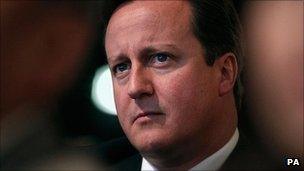Cameron: 'Moment of danger' for global economy
- Published
- comments

Mr Cameron says he is a "practical Eurosceptic"
David Cameron has said the world economy is at "a moment of danger" as a result of the eurozone crisis.
He told BBC political editor Nick Robinson there were "serious clouds on the horizon" and it was "absolutely vital" to stabilise the euro.
After that was done, he said, there must be "more on the growth front" in the UK to get the economy moving.
The PM also said safeguards were needed to protect UK interests if eurozone states begin closer integration.
'Real problem'
As EU finance ministers meet in Luxembourg to discuss the eurozone crisis, Mr Cameron told the BBC: "I think it is a moment of danger.
"I think there are some very serious clouds on the horizon, chief amongst them is the problems in the eurozone where the French economy, the German economy have both stalled, and that is a real problem for the British economy.
"I think what we've got to do is line up the problems. Dealing with the eurozone, that's absolutely vital, then we've got to the look at the British economy and say look we've got a deficit reduction plan, that's good, that keeps our interest rates low, but we need more on the growth front."
Mr Cameron said he believed the chancellor's announcement on Monday about credit easing to help small businesses would make "a big difference".
As the eurozone economic crisis shows no sign of abating, some of its 17 members have been talking about greater fiscal union to bolster the single currency in future and support weaker members.
EU referendum
The PM said that while it was "logical" for countries using the single currency to move closer to a single economic policy, the UK and nine other EU states outside the eurozone would need "certain safeguards" to protect the single market.
"This is not some naive view that they go off on their way and we are intensely relaxed about it. There are safeguards we need and the Liberal Democrats completely agree with that," he said.
Nick Robinson said the Treasury and Foreign Office were already discussing how to protect British interests, in areas such as the City of London and the single market, should there be a fundamental change in the shape of the EU.
Mr Cameron is also facing calls from many of his MPs for a significant shift to the UK's relationship with Europe. Some want the UK to claw back powers from the EU while others are seeking a referendum on the UK's membership.
The prime minister said: "We mustn't get ahead of ourselves.
"There will be quite a fundamental change down the track as the eurozone countries come together as I think they have to, to try and make this single currency... work."
He added: "Right now let's deal with the problems and the issues people care about most."
Deputy PM Nick Clegg, whose Liberal Democrats are the most pro-European of the three biggest UK parties, has said the eurozone crisis should not be used as a justification to radically alter the UK's relationship with the European Union.
But the deputy prime minister has warned that allowing eurozone states to act against the interests of other EU members would create a "divisive and weaker" Europe.
Amid growing calls for an "in-out" referendum about the UK's membership of the EU - and the prospect of a Commons debate on the issue later this year - Mr Cameron said he believed this was the wrong course of action.
"I don't think the choice the country really wants to address is 'in or out'," he told BBC Breakfast. "I think the choice people would like is 'actually can we stay in this organisation because it is vital for our trade and economic future but can we change it?"